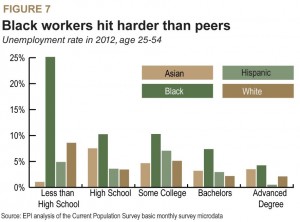Black residents in the Washington region have a much harder time finding a job than white residents ‘even when they have a college degree. And the gap in earnings between white area residents and Black and Hispanic residents is growing. This suggests that policymakers need to focus not only on improving education and training, but also on efforts to help connect residents with jobs.
No matter the education level, Black residents in the region face far higher unemployment levels than other residents. (See Figure.) Thisis particularly true for Black workers without a high school diploma, where one in four Black residents are unemployed, compared with fewer than 10 percent of White, non-Hispanic residents. Even Black residents with an advanced education face job challenges. The unemployment rate for Black residents with a college degree or more is 6 percent, compared with 2 percent for White residents with the same educational attainment.
Beyond these challenges, the wage gap between Black workers and White workers has risen since in recent years. In 2007, the typical Black worker earned 74 cents for every dollar the typical White worker earned. By 2012, that had fallen to just 70 cents. Hispanic workers also face a large wage gap. Hispanic residents in the region made about 73 cents for every dollar earned by the typical Black resident in 2012 and just 51 cents for every dollar earned by White, non-Hispanic residents.
It is not entirely clear why Blacks are facing a harder time in the region, but certainly discrimination and a lack of access to opportunities play a role. A recent study in Baltimore, for example, that followed nearly 800 low-income school children for nearly 30 years found higher employment levels among White men without college degrees than Black men without college degrees. One of the reasons? Many more White men were able to secure well-paying industrial jobs due to connections from friends and family in the industry.
With many Black residents being left behind in the region, policymakers should look to solutions that can help improve access and opportunity for them.
To print a copy of today’s blog, click here.

